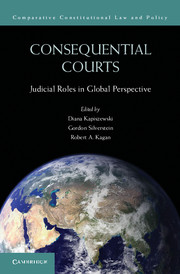Book contents
- Frontmatter
- Contents
- Contributors
- Introduction
- PART I EXPANDING JUDICIAL ROLES IN NEW OR RESTORED DEMOCRACIES
- Part II EXPANDING JUDICIAL ROLES IN ESTABLISHED DEMOCRACIES
- PART III FOUR “PROVOCATIONS”
- 13 Why the Legal Complex is Integral to Theories of Consequential Courts
- 14 Judicial Power
- 15 Constitutional Politics in the Active Voice
- 16 The Mighty Problem Continues
- Conclusion Of Judicial Ships and Winds of Change
- Index
- References
13 - Why the Legal Complex is Integral to Theories of Consequential Courts
Published online by Cambridge University Press: 05 April 2013
- Frontmatter
- Contents
- Contributors
- Introduction
- PART I EXPANDING JUDICIAL ROLES IN NEW OR RESTORED DEMOCRACIES
- Part II EXPANDING JUDICIAL ROLES IN ESTABLISHED DEMOCRACIES
- PART III FOUR “PROVOCATIONS”
- 13 Why the Legal Complex is Integral to Theories of Consequential Courts
- 14 Judicial Power
- 15 Constitutional Politics in the Active Voice
- 16 The Mighty Problem Continues
- Conclusion Of Judicial Ships and Winds of Change
- Index
- References
Summary
A puzzle lies at the heart of the excellent treatments of courts in this volume. With important exceptions, it is the absence of a certain kind of politics. In these pages there are the distal politics of parties and dictators, insurgencies and militaries, civil society and religions, unions and the media. Mostly absent, however, are the most proximate politics to courts – the legal occupations which embed, enable, draft, litigate, implement, oppose, critique, and ally with judges and courts, a configuration of occupations captured by the concept of “the legal complex” (Halliday and Karpik 2011).
There has been a tendency in scholarship on courts in general to permit its hermetic segregation from scholarship on other legal occupations – most notably the legal profession, but also legal academics and practicing lawyers within the state or corporations (Feeley 2012). This detachment from courts in their most immediate institutional context contributes to a hollow core theory of judicial politics, a lacuna which does not properly reflect the practices of such politics either in history or in contemporaneous headlines.
- Type
- Chapter
- Information
- Consequential CourtsJudicial Roles in Global Perspective, pp. 337 - 348Publisher: Cambridge University PressPrint publication year: 2013
References
- 6
- Cited by



